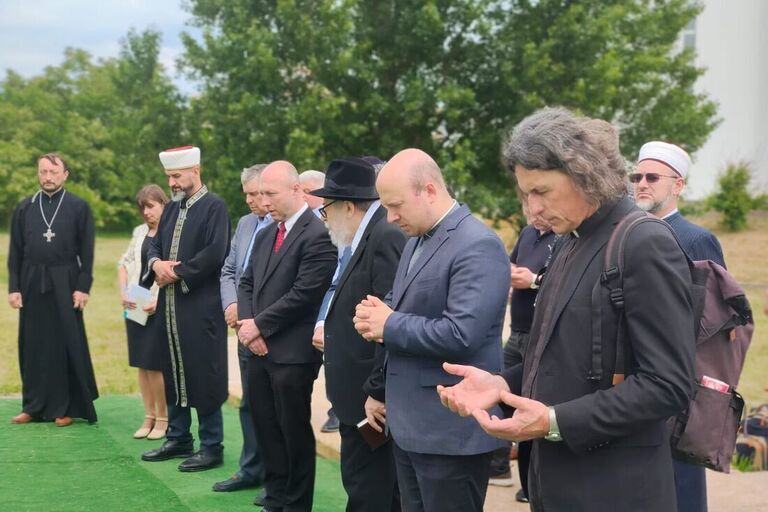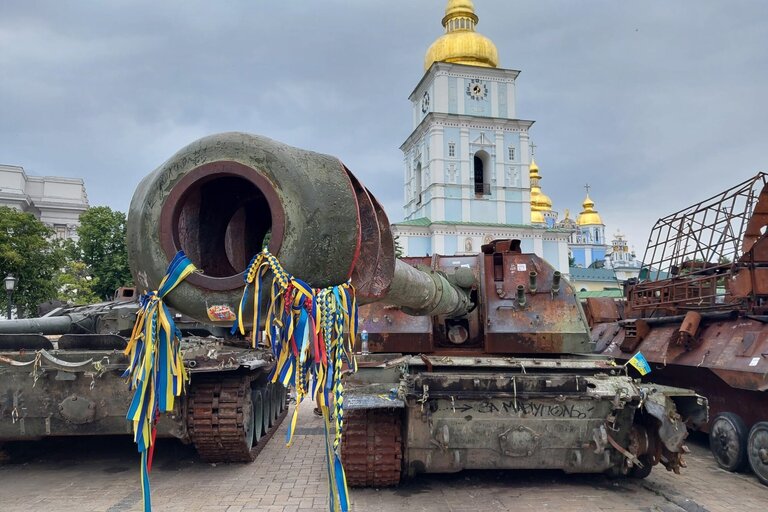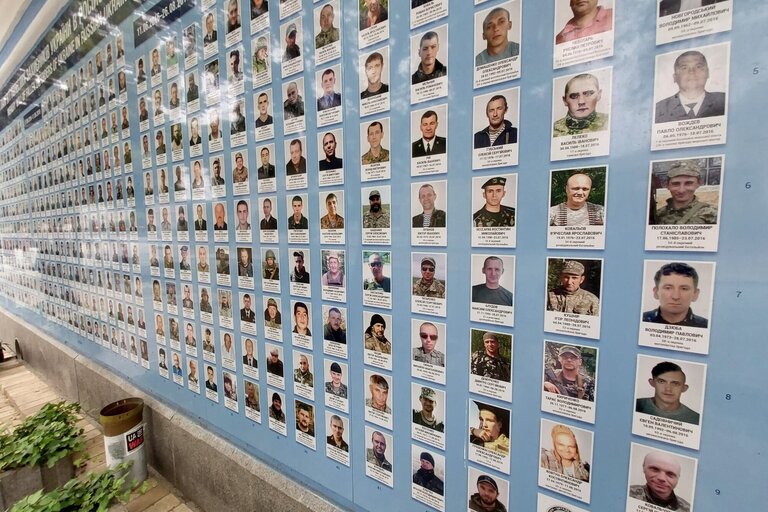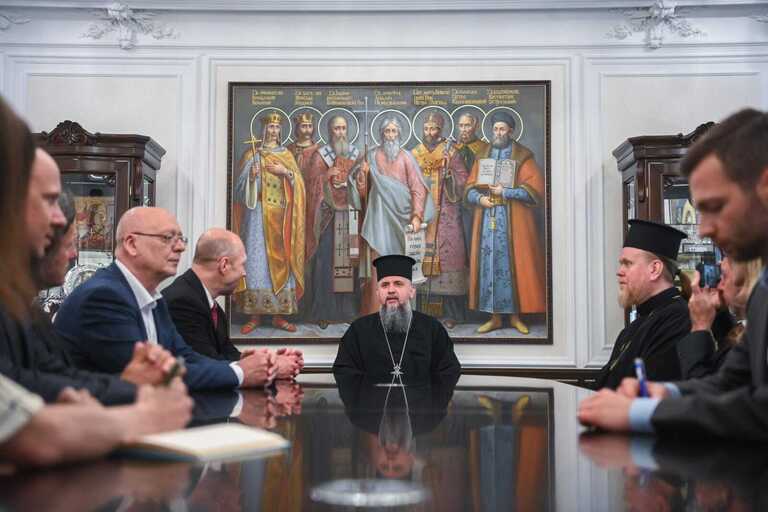Ecumenical delegation visited Ukraine
As an expression of solidarity with the people of Ukraine, the Ministry of Foreign Affairs of the Czech Republic initiated a trip of representatives of Czech churches and religious societies to Ukraine from 6 to 8 June 2023.
The delegation honoured the memory of the victims of the massacre in Bucha, where an interfaith prayer of Czech and Ukrainian representatives of Christianity, Judaism and Islam took place in the St. Andrew's Cathedral.
The visit was led by Robert Řehák, Special Envoy for Holocaust, Interfaith Dialogue and Freedom of Religion. The trip was also attended by Petr Jan Vinš, Secretary General of the Ecumenical Council of Churches, Pavel Pokorný, Synodal Senior of the Evangelical Church of Czech Brethren, Karol Sidon, Chief Regional Rabbi, and Ewelina Ochab, expert and lawyer. The delegation came at the invitation of the Head of the State Service for Ethnopolitics and Freedom of Conscience, Viktor Jelenski, which he sent to the Special Envoy as Vice-Chairman of the International Religious Freedom or Belief Alliance (IRFBA).
The interfaith prayer at the site of the mass grave in Bucha was held with the participation of representatives of the Orthodox Church of Ukraine, Evangelical churches, the Roman Catholic Church, the Jewish community and Muslims from among the Crimean Tatars.
The delegation was received in Kiev by Andriy Melnyk, Deputy Minister of Foreign Affairs of Ukraine, who sincerely appreciated the Czech support since the beginning of the Russian invasion. At the end of the visit, a meeting was held with the highest representative of the Orthodox Church of Ukraine, Metropolitan Epiphanius of Kiev and all Ukraine, who briefed the delegation on the main problems of the faith communities in the war-torn country.
Source: Ministry of Foreign Affairs of the Czech Republic/Ecumenical Council of Churches in the Czech Republic
A few notes in Ukraine in June 2023. Facing destruction in Bucha
(Written by: Pavel Pokorný, Synodal Senior of the ECCB)
A comfortable modern train takes us from the Polish border to Kiev. The sun-drenched landscape passes outside the windows. Meadows, fields, draws, mixed forests. Neat little villages. The golden domes of Orthodox churches shine in the distance. On the outskirts of Lviv we see modern housing estates, rugged, colourful. Only at each railway bridge a guard post reminds us that this country is at war. On guard...
Kiev is alive with the normal hustle and bustle of a big city until late in the evening. Transport, shops, churches, everything works. Only the statues in the squares are covered with wooden boards and sandbags. The air defences may be able to shoot down almost all the Russian missiles still in the air, but their falling debris can be half the size of a car. Alarms are sounded in Kiev almost every day. The smartphone app Air Alert triggers a warning as soon as a Russian plane carrying missiles takes off in Belarus. You can see on a map where it is heading and how long before the missile is expected to hit. Sometimes there are only minutes to escape to a shelter. Our hotel has a shelter in the underground garage. It's not a pleasant place. I'm told you usually sit there for a few hours at night before the alarm is lifted.
Czech embassy staff in Kiev are chronically sleep-deprived. They say that it has not happened for several months that for two consecutive days not a single alarm has been sounded in Kiev. Only during our visit. And no sooner had we boarded the train for the return journey than the sirens went off. Thinking of Kiyevans...
In Sofia Square there is a wall with the names and photos of the fallen. It starts in 2014 and stretches into the indefinite future. "Here, on 28 September 1914, the volunteers of the Czech Companion were sworn in and its banner was consecrated. This marked the beginning of the formation of the armed forces of the future Czechoslovak Republic." Interesting. We were told that the Czechoslovak Legion was founded in Russia...
About 25 km west of Kiev is the town of Bucha. A kind of suburb. There was no fighting here. The houses are not destroyed. The Russian army captured Bucha by assault from Belarus without a fight during the first days of the invasion in February 2022. But it was stopped by the Ukrainian army on the Irpin river outside Kiev. Of course, even the disappointment of the expected glorious and easy victory cannot explain the extraordinarily cruel torture and murder of civilians in Bucha by the Russian army. We were there. We have spoken to survivors. We saw the mass grave, we saw the meticulous documentation taken by international experts and journalists after the Russian army left Bucha. There can be no doubt about this fact and its magnitude. We wept and prayed. Orthodox, Pentecostals, Jews, Muslims, Evangelicals, Catholics, Old Catholics together. Even those who profess no religion. With a desire for peace and justice, without a trace of hatred...
We heard other personal testimonies and stories during a visit to the Pentecostal congregation in Hostomel. It was there that some of the first fighting for the airfield took place. The aftermath is still visible today in the form of destroyed buildings. We can't see into people's souls. We only suspect that war traumas are more difficult and longer to repair than buildings...
Ukraine's Deputy Foreign Minister Andriy Melnyk tells us that the Ukrainians are well aware of the support and assistance from the Czech Republic. It is extraordinary how this help came quickly and was the initiative of ordinary people. You are going to be written about in our textbooks, says the deputy. We then talk about how difficult it is to limit the negative influence of the Ukrainian Orthodox Church of the Moscow Patriarchate and at the same time to avoid such intervention being interpreted as a restriction of religious freedoms.
Metropolitan Epiphanius of Kiev, a representative of the Orthodox Church of Ukraine, tells us how their St. Michael's Cathedral became a refuge for students injured in the 2013 and 2014 Maidan fighting in Kiev. If Russia were to win, Ukraine would cease to exist. I keep getting the idea that Bucha is a suburb of Prague...
Pavel Pokorný, Synodal Senior of the ECCB




